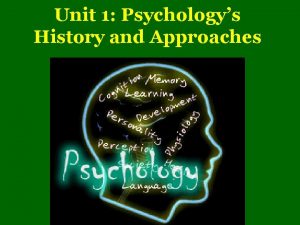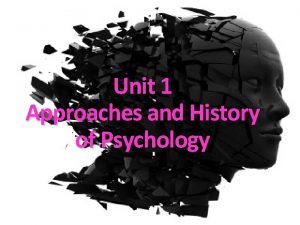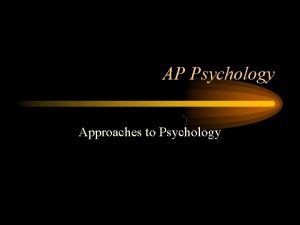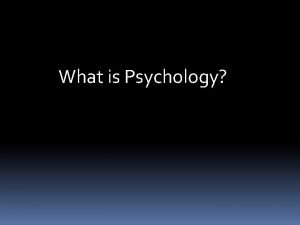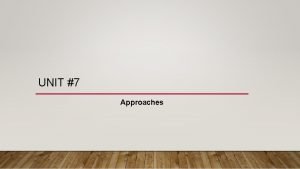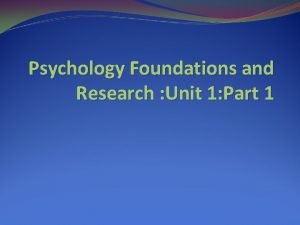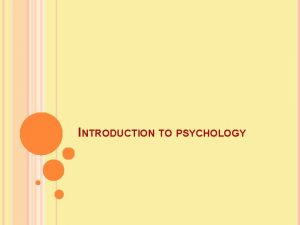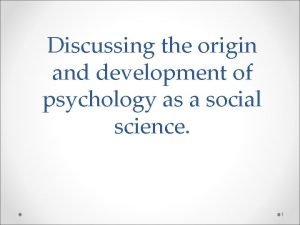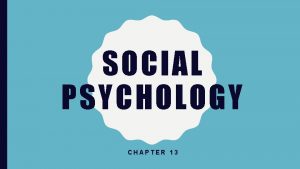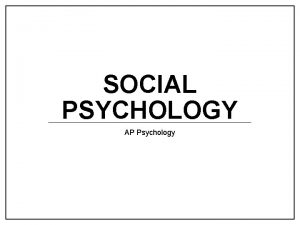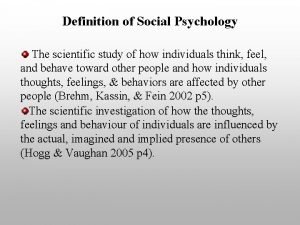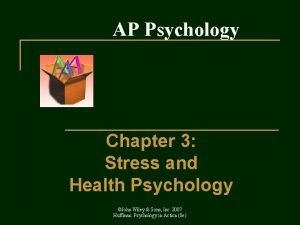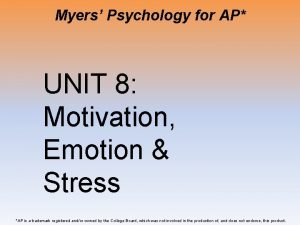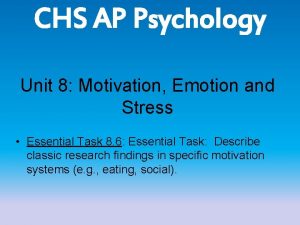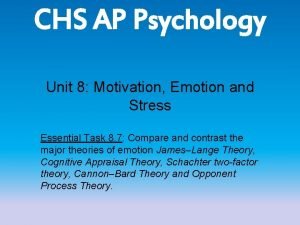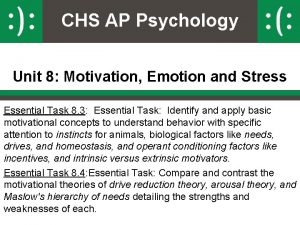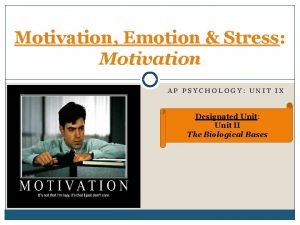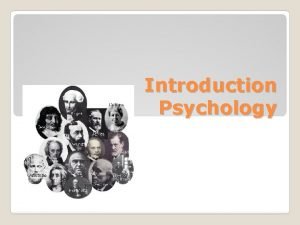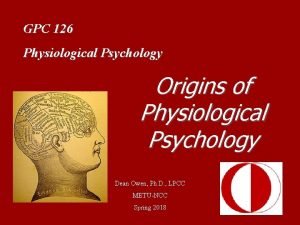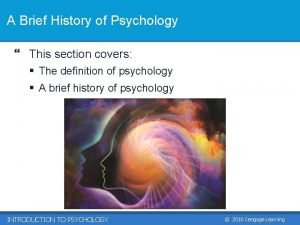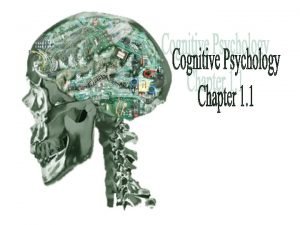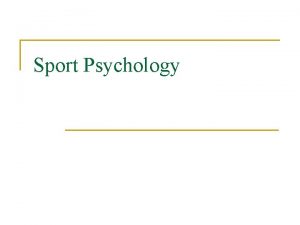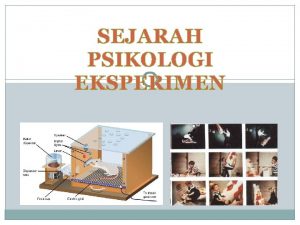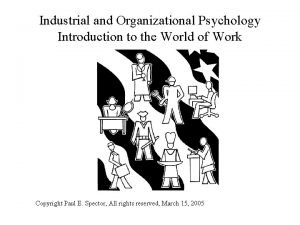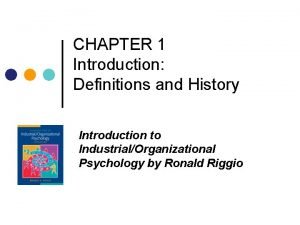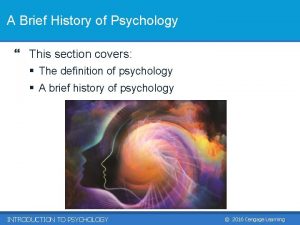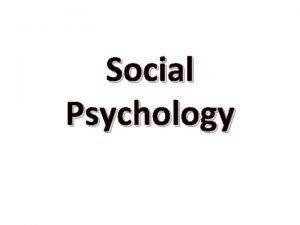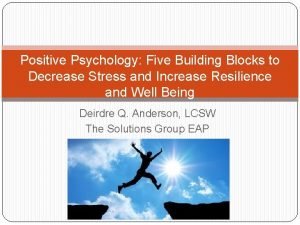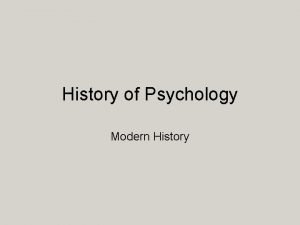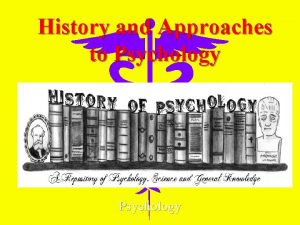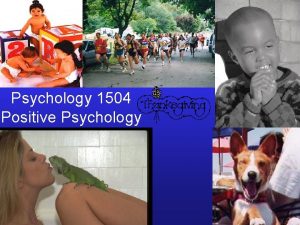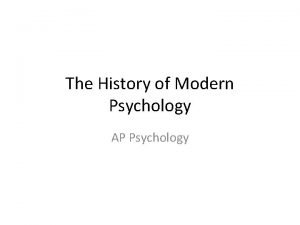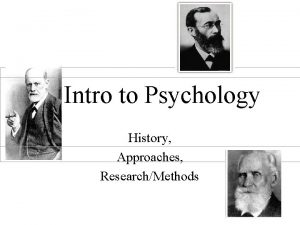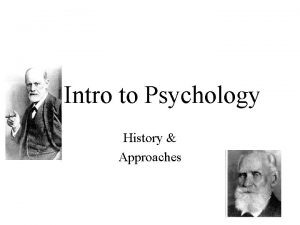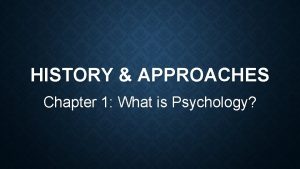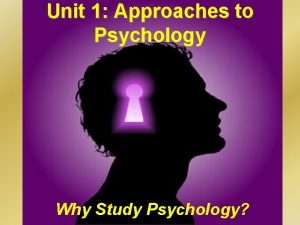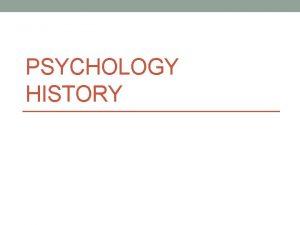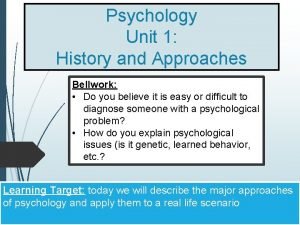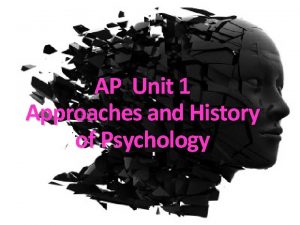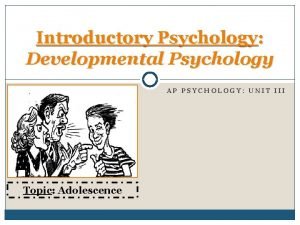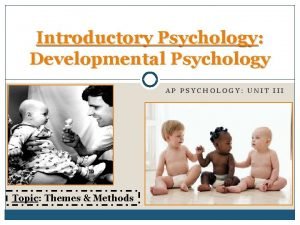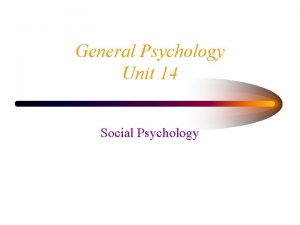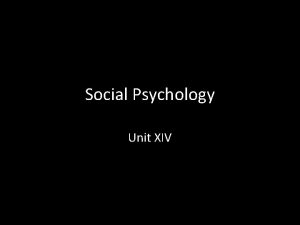AP Unit 1 Approaches and History of Psychology





































- Slides: 37

AP Unit 1 Approaches and History of Psychology

Homework tonight! Homework- assigned reading with guided notes/worksheet (pages 8 -15)- This is due tomorrow. Yes- you have homework! Just expect to have it every night and then you will be pleasantly surprised on the nights you don’t!

1. 1 Why Study Psychology? Psychology provides tools to help us gain insight into our own behavior, as well as our relationships with others. Definition of Psychology: the scientific study of behavior and mental processes. Psychology falls under the Behavioral Science. 3

Two Major Goals! Conduct research to Apply the findings of create and disseminate psychological science knowledge Scientists conduct basic research in order to improve understanding of behavioral and mental processes Improve the lives of people, diagnosis and treatment of mental illness, vocational and educational counseling, improvement of physical health, social policy and applications to law, increased effectiveness of management, etc. 4

4 Basic Goals of Psychology: 1. Description: the kid at the candy aisle is having a melt down. 2. Explanation: he wants the pretty candy 3. Prediction: 4. Influence: He will get the candy Wal-Mart knows that moms have already lost patience with their kids by the time they get to the checkout line so they put the candy there to get the kids to wear mom down to buy the candy. 5

1. Description Learning about psychology can help you gain… – a better understanding of your own behavior. – knowledge about how psychologists study human and animal behavior. fotosearch. com – practical applications for enriching your life. Example: The child throws a fit every time he goes to Wal-Mart and his mom says no by the 6 candy aisle.

2. Explanation Psychology is Empirical that means information is obtained through observation and experimentation not common sense or guessing. http: //lewweb. net/science/images/SMflowchart. jpeg moisiadis. com 7

3. Prediction By accumulating knowledge we are able to predict what people or animals will do or think in certain situations 8 and predict future behaviors.

4. Influence Scientist seek to influence behavior in helpful ways. knychfamily. blogspot. com Chains like Wal-mart have done these scientific observations and place candy as you check out because when your kid is screaming 9 sometimes it is easier to just buy the candy bar.

Basic Science/Research: Research • Ex. Research on drug effects on the brain. There are two types of science that influences psychology. Applied Science/Research: putting that research to use for a purpose • Example: Using research on how drugs effect the brain to come up with a new antidepressant to help people 10 suffering from depression.


Empirical Science: knowledge originates in experience and that science should rely on observation and experimentation The scientific method is used to reduce errors and biases. A theory is a proposed explanation. In Psychology we will be studying different theories. Hypothesis is predicting a Relationship between variables 12

Chapter 1. 2: History of Psychology- THE GREEKS! Socrates, Aristotle, Hippocrates and Plato (384 -322 BCE. ) Started asking how the mind and the body were related? ? Were the separate or related? ? §Are ideas inborn or is the mind a blank slate filled by experience? en. wikipedia. org Terms to Know- Monism: belief that the mind (soul) and body are different aspects of the same thing Dualism: the mind (soul) can exist separately from the 13 body

The Dark Ages and the Renaissance Dark Ages: Scientific assumptions were largely untested due to lack of methods and lack of enthusiasm for challenging religious views Renaissance: significant developments in art and literature and the invention of the movable type printing press! Still a fear of religion- BUT some scientific development Sir Francis Bacon (1561 -1626) argued for a new science based on the belief that people can understand the natural world via observation and experimentation

The Enlightenment Rene Descartes “I think therefore I am” Dualism: the concept of the mind and body are separate and distinct. plato. stanford. edu 15 http: //www. youtube. com/watch? v=Ba. KLrqx. C 70 c

Charles Darwin (1809 -1882) Theory of natural selection (1859) Darwin’s theory encouraged scientific inquiry Very controversial 16

John Locke 1. One of his major contributions was to the field of psychology and he is often called the “Father of English Psychology. ” 2. Wrote Tabula Rasa. Locke proposes that we are all born with certain knowledge and principles that helps us to become part of society. He states that it is through experience, of the world around us, this is how one forms ideas. He further states that human knowledge is gathered in 2 distinct ways through sensation and reflection. 3. Innate: Being born with it. 17

Who’s Your Daddy? ? ? Wilhelm Wundt is the father of Psychology 3 Things you need to remember about your daddy: 1. Wilhelm Wundt opened the first psychology laboratory in Germany. 2. Changed psychology from a philosophy to a science. 3. Studied introspection. Introspection means looking within yourself. How do you feel about this or that. How does that rose make you feel? 18

Wilhelm Wundt Structuralism vs. Broke down consciousness to basic thoughts. Picture a blade of grass. A structuralist might have lingered over the intensity of the green color of the blade of grass, the clarity of its texture, and the roughly rectangular shape of the blade. Introspection - self-observation of one’s own conscious experiences Functionalism Investigate the function, or purpose of consciousness rather than its structure James thought that we developed useful habits, such as washing our hands before eating because they help us function more effectively in our daily lives. https: //www. youtube. com/watch? v=SW 6 nm 69 Z_IE William James 19 (1842 -1910)

William James What you have two daddies? Yes, one is your American Daddy. Known as the Father of American Psychology. You also need to know he wrote the 1 st Psychology Book and Father of Functionalism. 20

Gestalt Psychology “The whole is different than the sum of its parts. ” Max Wertheimer (1880 -1943) alexbinetti. wordpress. com 21

Can you read this? This is bcuseae the huammn mnid deos not raed ervey lteter by istlef, but the word as a wlohe. Amzanig, huh?

What is it? ? We like to fill in the gaps so that we see objects as wholes. 23

Contemporary Psychology § Psychology’s Perspectives § A lot depends on your viewpoint § Eclectic means that you use several of theories to describe behavior. 1. Psychoanalysis that is now called Psychodynamic 2. Cognitive 3. Behavioral 4. Biological 5. Socio-cultural 6. Humanistic known also has Positive Psychology 7. evolutionary 24

Evolutionary Perspective Focuses on Darwinism. We behave the way we do because we inherited those behaviors. Thus, those behaviors must have helped ensure our ancestors survival.

Evolutionary Perspective?

Psychodynamic Psychology pg. 18 Sigmund Freud: Father of Psychoanalysis NOT psychology!!!! Also called Psychoanalytic. Study of unconscious motives and conflicts that determine behavior. Unconscious are motives that you are not aware of. For instance if someone with brown hair rejects you, then you might not talk to people with that color hair. Conscious are motives that you are aware of. 27

Psychoanalytic Psychology pg. 18 Study of unconscious motives and conflicts that determine behavior. Freud used the technique called free association He would say a word and you would say the first word that popped in your head and he would then analysis what is going on in your unconscious. 28

Cognitive Approach Cognition is the mental processes involved in acquiring, processing, storing & using information Cognitive Psychologists return to the study of learning, memory, perception, language, development & problem solving Example: Is your boyfriend child-development-guide. com dumping you traumatic or do you just think it is therefore you are depressed? Or. . your ability to do math compared to a 5 year old. You can understand abstract thinking that goes along with statistics. 29 sciencedaily. com

Cognitive Approach JEAN PIAGET 1896 – 1980 Worked in France administering Binet’s IQ test. Children do not think like adults. Why? Created 4 stages of cognitive ability that accurately explain the behavior of children. Influenced teachers and school system. 30

Biological Approach Focus How the body and brain create emotions, memories, and sensory experiences. Sample Issues • Depression and antidepressants. Problems with thyroids. • How are messages transmitted within the body? • How is blood chemistry linked with moods and 31 motives?

Behavioral Approach John Watson (1878 -1958) Scientific Psychology should focus on observable behavior. B. F. Skinner • Behavior is learned • What motivates you to change your behavior? http: //www. youtube. com/watch? v=P 4 Rb 9 n_s. QDg&feature=related 32 Ivan Pavlov

Social-Cultural Approach Focus How behavior and thinking vary across situations and cultures. Sample Issues • How are we, as members of different races and nationalities, alike as members of one human family? • How do we differ, as products of different social contexts? • Why do people sometimes act differently in groups than when alone? 33

Humanistic Approach also called Positive Psychology You have the potential to be great. Self Actualization. Feel Good approach. Client Centered Therapy Hierarchy of needs. Carl Rogers believed in “client centered therapy” Abraham Maslow came up with the Hierarchy of needs 34

Fields of Psychology Psychologist is someone who is trained to observe and influence behavior in people. Psychiatrist is a medical doctor that can prescribe medicine. 35

Psychology’s Big Debate Nature Versus Nurture Where you born that way or did your environment make you that way? Superman?

Tips for Studying Psychology SQ 3 R Survey, Question, Read, Rehearse, Review. Study Tips Distribute your study time Learn to think critically In class, listen actively Overlearn Be a smart test-taker
 Linear perspective ap psychology
Linear perspective ap psychology Module 2 today's psychology and its approaches
Module 2 today's psychology and its approaches How did wilhelm wundt break down consciousness
How did wilhelm wundt break down consciousness 7 approaches to psychology
7 approaches to psychology Structuralism vs functionalism psychology
Structuralism vs functionalism psychology Where do most psychologists work
Where do most psychologists work Carl rogers humanistic approach
Carl rogers humanistic approach Seven approaches to psychology
Seven approaches to psychology Unit 10, unit 10 review tests, unit 10 general test
Unit 10, unit 10 review tests, unit 10 general test Definition of psychology
Definition of psychology Psychology studies
Psychology studies Structuralist school of thought
Structuralist school of thought Positive psychology ap psychology definition
Positive psychology ap psychology definition Deindividuation psychology definition
Deindividuation psychology definition Fundamental attribution error ap psychology
Fundamental attribution error ap psychology Social psychology is the scientific study of:
Social psychology is the scientific study of: Health psychology definition ap psychology
Health psychology definition ap psychology Myers ap psychology unit 8
Myers ap psychology unit 8 Ap psychology unit 8 motivation emotion and stress
Ap psychology unit 8 motivation emotion and stress Ap psychology unit 8 motivation and emotion test
Ap psychology unit 8 motivation and emotion test Unit 8 ap psychology
Unit 8 ap psychology Alfred kinsey ap psychology
Alfred kinsey ap psychology History of developmental ideas in psychology
History of developmental ideas in psychology Definition of physiology
Definition of physiology Emphasis
Emphasis Forensic psychology history
Forensic psychology history History of cognitive psychology
History of cognitive psychology History of psychology summary
History of psychology summary History of cognitive psychology
History of cognitive psychology Sport psychology history
Sport psychology history Pengertian psikologi eksperimen
Pengertian psikologi eksperimen Timeline of the history of i/o psychology
Timeline of the history of i/o psychology History of forensic psychology
History of forensic psychology History of organizational psychology
History of organizational psychology Brief history of psychology
Brief history of psychology Aristotle university of thessaloniki psychology
Aristotle university of thessaloniki psychology Scope of positive psychology
Scope of positive psychology History of forensic psychology
History of forensic psychology
